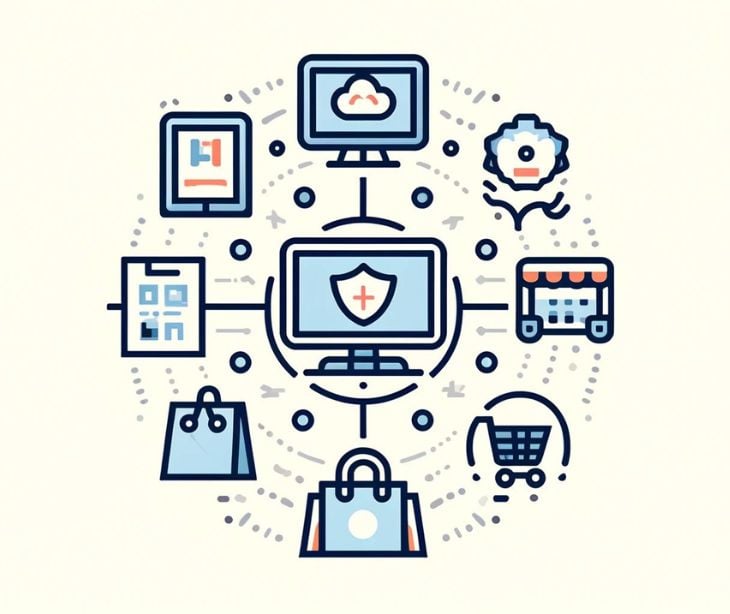
Insurance agents handling protected health information (PHI) must understand and comply with the Health Insurance Portability and Accountability Act (HIPAA). HIPAA non-compliance can have severe consequences for insurance agents who handle PHI. The legal ramifications, including fines and penalties, can financially hurt insurance agents and their businesses.
Additionally, according to American Retrieval, “Insurance companies that are dealing with medical records are required to protect sensitive data at all times. Whether it be during the transfer or storage of protected health information, there must be technical, physical, and administrative safeguards put into place that keep medical records safe from potential breaches.”
Understanding the necessity for compliance
Covered entities extend beyond healthcare, as non-healthcare industries are entrusted with sensitive personal information. These entities must implement security measures, transparent data practices, and proactive compliance efforts by HIPAA regulations.
In the context of privacy regulations like the Health Insurance Portability and Accountability Act (HIPAA), a covered entity is defined as:
"(1) health plans
(2) health care clearinghouses
(3) health care providers who electronically transmit any health information in connection with transactions for which HHS has adopted standards."
The insurance sector, much like healthcare, deals extensively with personal data, including health information, in the case of health insurance providers. So, insurance companies are considered covered entities, which need data protection measures to handle PHI.
The privacy and security of clients' PHI are at stake when HIPAA regulations are not followed. Breaches of sensitive information can result in identity theft, financial fraud, and other harmful consequences for clients. Insurance agents need to prioritize HIPAA compliance, implementing security measures to protect their clients' information and avoid the potential consequences of non-compliance.
Reasons for HIPAA compliance
Insurance agents have a moral and ethical obligation to protect their clients' PHI. Beyond this obligation, there are three reasons why insurance agents should have a strong HIPAA compliance plan that goes beyond just annual training.
Reputation protection
One significant reason for insurance agents to prioritize HIPAA compliance is to protect their reputations. Violations of HIPAA regulations can quickly become public knowledge, leading to negative publicity. This negative publicity can have a detrimental impact on insurance agents' reputation and their business.
Avoiding legal repercussions
HIPAA violations can result in severe legal consequences, including fines and legal action. The Department of Health and Human Services Office for Civil Rights (OCR) enforces HIPAA regulations and can impose significant penalties for non-compliance. Insurance agents who fail to prioritize HIPAA compliance may face substantial fines and the costly legal fees associated with defending against legal action.
Gaining a competitive advantage
HIPAA compliance can serve as a differentiating factor for insurance agents in a competitive market. By marketing themselves as HIPAA compliant, insurance agents can attract clients who prioritize the privacy and security of their PHI. With growing concerns about data breaches and identity theft, clients are increasingly seeking insurance agents who prioritize data protection.
Ensuring HIPAA compliance as an insurance agent
As an insurance agent, it is necessary to prioritize HIPAA compliance to protect your client's sensitive information and avoid legal repercussions. Here are a few steps you can take to ensure HIPAA compliance:
Educate yourself
Stay updated on the latest HIPAA regulations and requirements. Take advantage of training programs and resources provided by reputable organizations and industry experts.
Conduct regular risk assessments
Perform regular risk assessments to identify any vulnerabilities in your data security practices. This will help you address potential risks proactively and implement appropriate safeguards.
Develop policies and procedures
Establish policies and procedures that outline how you handle, store, and transmit PHI. Ensure that your staff is well-trained and adheres to these policies consistently.
Implement technical safeguards
Use encryption, firewalls, secure networks, and access controls to protect electronic PHI. Regularly update and patch your systems to address any security vulnerabilities.
Training staff
Provide regular HIPAA training to your staff members to ensure they understand the importance of safeguarding PHI and are familiar with the necessary protocols.
Monitor and audit
Regularly monitor your systems and conduct internal audits to identify any potential breaches or non-compliance issues. Promptly address any findings and take corrective actions.
How can Paubox help
Paubox works to help CEs maintain cybersecurity and HIPAA compliance, which can be beneficial to insurance providers. HIPAA compliant email is guaranteed through Paubox Email Suite, which provides needed protections without the use of extra logins, passwords, or portals. With our HITRUST CSF-certified solution, all emails are encrypted, and sent directly from your existing email platform.
See also: HIPAA Compliant Email: The Definitive Guide
Insurance-related HIPAA violations
Aetna Life Insurance
In 2017, Aetna Life Insurance Company settled three HIPAA breaches by paying $1,000,000 to the OCR. The breaches involved exposing plan documents online, making sensitive information visible through mailed envelopes, and disclosing a research study on envelopes. Aetna failed to conduct necessary security evaluations, implement identity verification procedures, limit PHI disclosures, and establish proper safeguards.
Anthem
The 2015 Anthem data breach, one of the largest in healthcare, exposed ePHI for 79 million individuals. Anthem settled a class-action lawsuit for $115 million in 2018 and paid a $16 million penalty for HIPAA violations. The penalties were due to cybersecurity shortcomings, including a lack of risk analysis, insufficient monitoring, and inadequate access controls dating back to 2014.
FAQs
Does HIPAA apply to insurance agents?
Yes, HIPAA (Health Insurance Portability and Accountability Act) applies to insurance agents who handle protected health information (PHI) in the course of their business activities.
Do insurance agents need consent to handle protected health information?
Yes, insurance agents must obtain the necessary consent from individuals before handling their protected health information in compliance with HIPAA regulations.
What can insurance agents use to handle protected health information?
Insurance agents can use secure and HIPAA compliant systems and processes to handle protected health information, ensuring the privacy and security of the data in accordance with HIPAA requirements.
Subscribe to Paubox Weekly
Every Friday we bring you the most important news from Paubox. Our aim is to make you smarter, faster.




